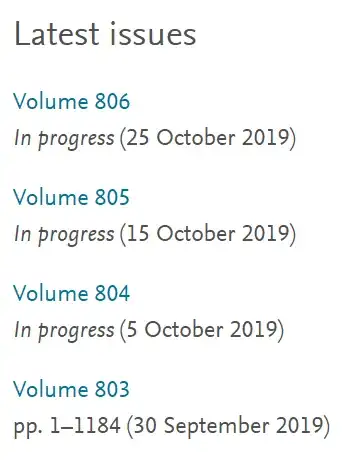It is to ask that I sent my original article in some journal, reviewers asked me to make some amendments which I did on time. The editor then sent me an email with their decision of acceptance. Now they have published their journal new edition, but my article is not published. Is it legal or ethical to do this?
-
3The article has been accepted, but was probably not ready for this edition of the journal so it will be in the next one. Cycles of producing journals is one thing, getting articles ready for publication is a different cycle waiting on reviewers turn around and authors also turning the revisions around... – Solar Mike Jul 31 '19 at 11:57
-
If the journal is available on line, you might check the 'in press' listings. Or, some journals show future incomplete issues. – Jon Custer Jul 31 '19 at 12:30
-
1Answer to your title: NO. But from your text, my guess would be: your article will be in a future issue. And thus, as far as we can tell, the editor's actions were legal and ethical. – GEdgar Jul 31 '19 at 12:38
-
2Have you even gotten and corrected proofs? Your paper is probably not even "done" yet, acceptance is just one step, see: https://academia.stackexchange.com/questions/55665/what-does-the-typical-workflow-of-a-journal-look-like you may have only completed step "editorial decision"... – Bryan Krause Jul 31 '19 at 16:26
3 Answers
If they've accepted it, they will publish it (eventually). They have nothing to gain otherwise by holding your paper. That it's not been published in the latest issue isn't a sign that they're not going to publish your paper at all - they could for example have a lot of papers that are online ready waiting for an issue, and they've hit their page count limit for this issue.
Whether the journal has the authority to reject your paper after accepting it is a separate question. In principle, they can: nothing gets published without the editor-in-chief's approval after all, and he can change his mind. In practice, this happens extremely rarely. If they find out for example that the paper is plagiarized, then it can be rejected. But to reject it because they changed their mind about whether it's publishable - that's almost never going to happen.
- 127,528
- 50
- 325
- 493
I would check the journal on line. The Journal of Alloys and Compounds us a good example of several things that could be going on.
First, the front page is mainly about the available articles (this is a small portion of the section):
The first article shown is a "In Press, Journal Pre-proof, Available online" - it is accepted, considered in press, and the proofs have not come back from the authors. But, it is available to be read by anyone and the pdf tells you how to cite it since it has a doi already.
Now, go to the issue listing near the top of the page:
Notice that the 30 September issue is done and considered fully published. There are then three more issues listed as "In progress", being filled out with articles from the queue of available accepted papers. (Many/most journals prefer to try and balance the variety of topics covered in an issue, although some prefer to have focused issues. This impacts how long a newly accepted article might take to surface). Again, any articles listed in the "In progress" issues are fully ready to be downloaded, read, and cited.
So, go online and see what is available - your article may be there.
- 12,775
- 7
- 43
- 54
Yes, it is both legal and ethical. I don't know why you would ask about legality, unless you have paid for publication.
But there are two things here. It may just be a matter of timing and available space. Your article may be in the pipeline for a future edition, but didn't make it into the most recent. Except for a special issue, I think that is the most likely explanation.
You have a letter of acceptance from the editor, so I think that your article will appear and don't suppose an editor would pull your article after sending such a letter unless they learned late of some serious issue - say scientific misconduct.
But prior to a letter of acceptance, the editor is free to act and include or not include any article. The reviewers work for the editor, not the other way round.
You are free to ask, of course. You can send a message that you thought your article was going to be in the recent issue and would like a publication update.
- 363,966
- 84
- 956
- 1,406
-
It would start to be unethical, arguably, if the delay gets considerable (in the timescale of years); see e.g. https://academia.stackexchange.com/q/124005/958, https://academia.stackexchange.com/q/123980/958. – Federico Poloni Jul 31 '19 at 12:14
-
@FedericoPoloni, that would depend on the reason (if any) for the delay. If the editor does this to disadvantage an author (or advantage another), then yes, but the ethical consideration then goes beyond the delay. But a long delay while claims are investigated isn't unethical on its face. – Buffy Jul 31 '19 at 12:30
-
4Many journals have many many months of backlog before accepted articles get published. Some are beyond one year. – Wolfgang Bangerth Jul 31 '19 at 12:31
-
@WolfgangBangerth Yes, and personally I consider that unethical. – Federico Poloni Jul 31 '19 at 12:37
-
@FedericoPoloni is it unethical if it does not get published in your timeframe but does in their timeframe? – Solar Mike Jul 31 '19 at 13:25
-
@SolarMike Yes: in early career, it is important to have publications out, and "matters of timing and available space" are not a sufficient reason to jeopardize people's careers. – Federico Poloni Jul 31 '19 at 14:11
-
@FedericoPoloni perhaps an issue of the author not submitting sufficiently ahead of time rather than the publisher trying to cause the author to fail... ie a case of the 5 P's : "Proper Planning Prevents Poor Performance" – Solar Mike Jul 31 '19 at 14:15
-
@SolarMike If I am not missing the point completely, we are speaking about delays of the order of one year between acceptance and official publication. Are you suggesting that this is normal and the author should have planned ahead? If there is someone who failed to plan things properly, it's the journal. – Federico Poloni Jul 31 '19 at 14:26
-
@FedericoPoloni I can't find anywhere the OP mentioned 1 year or even 6 months or any real timeframe, if you want to "drive" a different question then you should do so. – Solar Mike Jul 31 '19 at 14:28
-
@FedericoPoloni, as an editor myself, let me give you my perspective on this. First, I agree that a year or more is just plain wrong. But half a year is not unreasonable: Many journals have quarterly issues, and production pipelines that require assignment of journals to issues 2 months before print. So even in the best of cases, if your paper is accepted at the right time, it will be 2 months to publication; if your paper is accepted at the wrong time, it's already 5 months. But that ignores the fact that you can't run a journal if your queue is so short that you don't know whether you're... – Wolfgang Bangerth Aug 01 '19 at 02:59
-
...going to have enough articles to even make a new issue. Remember that many journals publish 20 or 30 articles a year. If you empty the queue on the current issue, and no (or just a couple of) new articles get accepted in the next 3 months, then you can't publish: The publisher simply won't bear the cost of printing and distributing. As a consequence, you need to spread things out over at least a couple issues so you have two thin issues, rather than one full and one almost empty one. This already increases the time frame to between 5 and 8 months. There is nothing you can do about this. – Wolfgang Bangerth Aug 01 '19 at 03:01
-
@WolfgangBangerth Many journals publish articles as "online first"; this allows you to stamp an earlier publication date on your articles. If you decide print papers in issues in the order in which they are accepted, you can also assign issue and page numbers immediately, even if the print version hasn't been produced yet. – Federico Poloni Aug 01 '19 at 08:07
-
Also, it seems to me that you are overstating the importance of bound and printed issues. Something like 1% of the articles I read is printed these days, so I wouldn't worry too much about them. The correct approach should be "your paper is accepted; the dead-tree version is coming to libraries sometime in the future, but don't worry about that". – Federico Poloni Aug 01 '19 at 08:12
-
@FedericoPoloni: Indeed. I don't think anybody still cares about when a paper is printed. For all practical purposes, if someone tells me that the article is accepted (or published online), that's as good as if they tell me issue number and page range. --- As for the assignment of page numbers as soon as the article is available online first: Not so simple if your journal has multiple sections. For example, ACM TOMS has two separate sections and articles in section 2 follow all articles in section 2. I won't know page numbers for the second section until after section 1 is complete. – Wolfgang Bangerth Aug 01 '19 at 21:59
-
@WolfgangBangerth (1) You may not care about the difference between accepted, "due to appear", and published, but there are hiring committees and dumb bibliometric systems that do. (2) That is not a valid excuse to me. If that happens to your journal, change either your page numbering system or your sectioning system. As I said, you are giving too much importance to how the printed issue looks, and too little importance to giving papers a "published" stamp as soon as possible. – Federico Poloni Aug 02 '19 at 08:35

